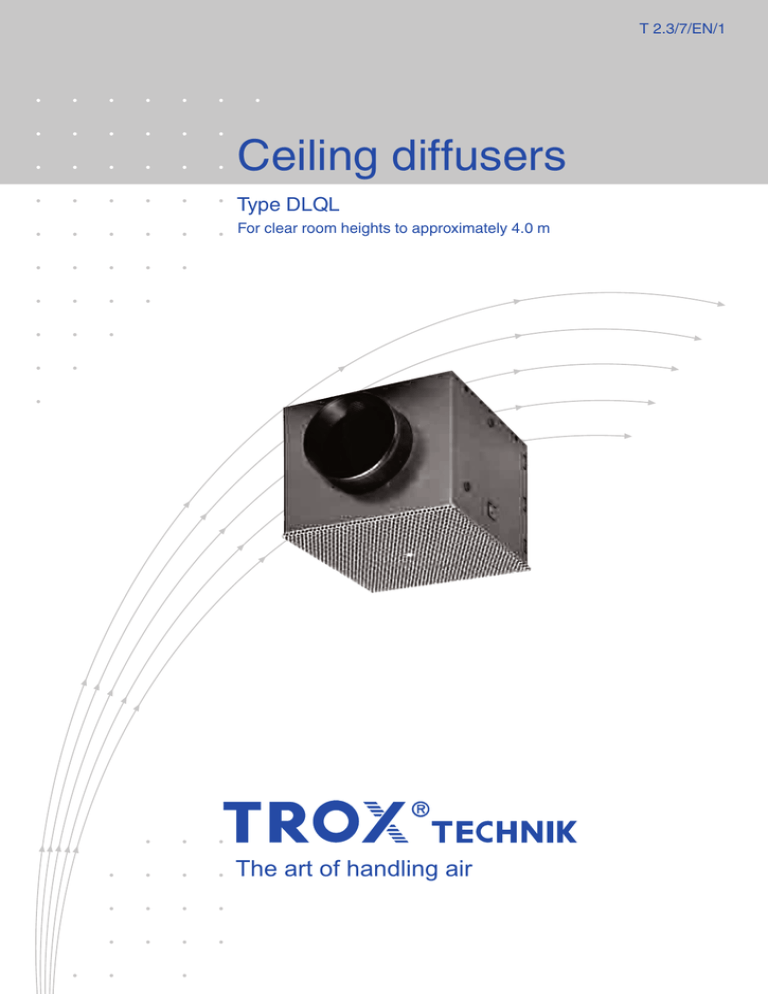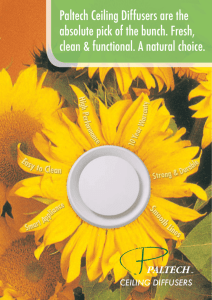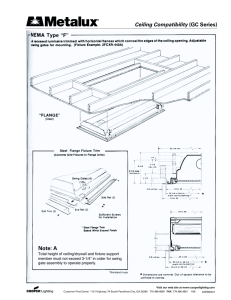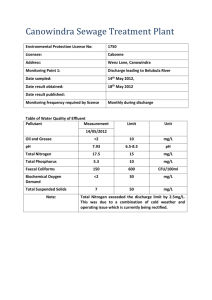
T 2.3/7/EN/1
Ceiling diffusers
Type DLQL
For clear room heights to approximately 4.0 m
The art of handling air
Contents · Description
Description __________________________________
Construction · Dimensions ______________________
Installation __________________________________
Directions of discharge ________________________
Nomenclature ________________________________
Quick selection ______________________________
DLQL...-H for side entry
Ceiling diffusers Type DLQL provide a comfortable air
conditioning of rooms. The horizontal discharge takes place
with high induction, which results in a rapid decay of supply air
velocity and temperature differential over a short distance from
the diffuser. Diffusers with one to four way discharge allow the
best discharge configuration to be selected to match the room
geometry and provide acceptable velocities in the occupied
zone.
The ceiling diffusers are suitable for all types of suspended
ceiling systems. The frameless construction ideally blends
with the design of the ceiling.
For comfort conditioning of the occupied zone the diffusers
can be used for room heights up to 4 m.
Special characteristics
– Face plate made of powder-coated perforated sheet metal
– Face plate in various dimensions can be integrated into
conventional ceiling systems
– Additional blanking plates to provide various air discharge
directions
2
2
3
4
5
6
7
Acoustic data
Supply air, top entry __________________________ 8
Supply air, side entry ________________________ 9
Extract air ________________________________10
Aerodynamic data ____________________________11
Order Details ________________________________12
DLQL...-V for top entry
The ceiling diffusers consist of a sheet metal casing and a
face plate made of perforated sheet metal. The construction
with the side entry spigot is achieved using an additional
universal plenum box. Supply air diffusers have a baffle plate
on the rear of the perforated face plate.
Construction · Dimensions
Characteristics
– For supply or extract air
– Side or top entry spigot
– Recommended supply air temperature difference up to ±10 K
Construction features
– Face plate made of perforated sheet metal for fitting into T-bar
ceilings (T) or central fixing screw fastening for installation into
grid or plasterboard ceilings (P)
– Supply air construction with baffle plate
– Spigot connection suitable for circular ducts according to
EN 1506 or EN 13180
– Option with groove for lip seal
– Additional blanking plates to provide various air discharge
directions
DLQL...-H
Materials
– Face plate made of galvanised perforated sheet steel, casing
made of galvanised sheet steel
– Baffle plate made of acoustic non woven composite material
– Casing painted black (RAL 9005)
– Face plate powder-coated white (RAL9010)
Plenum box
The DLQL...-H construction has an additional universal plenum
box with side entry spigot.
– Plenum box suitable for DLQL
– Plenum box and flow rate control damper made of galvanised
sheet steel
– Control damper for flow rate balancing (optional)
– See leaflet 2/16.4/EN/... for dimensions and technical data
DLQL...-V
□K
Ø9.5
□B
Slot 6.4 × 11.4
ØD2
H2
50
H1
ØD1
C
50
□Q¹
Nominal
size
250
300
400
500
600
P²
□Q
□Q¹
Dimensions in mm
T²
□K
□B
C
ØD1
ØD2
111
158
158
248
593
216
198
111
398
593
372
354
131
298
498
598
593
593
593
8
□Q
8
□Q
290
476
590
272
458
572
156
189
158
198
248
313
¹ For P and T constructions the face plate size can be up to a max. of 623 mm
² Other dimensions for □Q insert into item8 of order code
H1
H2
258
34
123
258
198
303
248
313
353
418
28
44
55
64
Weight in kg
DLQL...-H
2.8
4.0
6.5
9.6
13.8
DLQL...-V
Plenum box
AK
0.9
008
2.0
002
1.2
3.1
4.4
001
010
012
3
Installation
The customer must install the ceiling diffusers, make all
connections, and provide the hanging system, connection
and sealing materials.
Only trained expert personnel should install and make the
appropriate connections.
All legal regulations for site work must be complied with.
The plenum box (side entry) has four suspension holes
and the casing (top entry) has four hanging brackets for
suspending the diffuser from the ceiling slab.
Use only certified hanging systems.
Installation into grid and plasterboard ceilings
The face plate of the ceiling diffuser (DLQL-P) is attached
to the casing with a central fixing screw. In the case of large
dimensions (above □Q = 500 mm), the face plate is equipped
with chamfered corners.
Installation into T-bar ceilings
The face plate of the ceiling diffuser (DLQL-T) rests on the T-bar
or on a similar profile. The casing rests on the back of the face
plate but it must be supported separately from the ceiling slab.
Installation into suspended ceiling systems
Grid ceiling
DLQL...-P
Suspension
holes
Hanging bracket
DLQL...-H
DLQL...-V
Ceiling tile
Face plate
Plasterboard ceiling
DLQL...-P
Plasterboard
ceiling
Face plate
T-bar ceiling
DLQL...-T
Ceiling tile
placed on
T-bar
Face plate
4
T-bar
Directions of discharge
Without blanking plates, the air is discharged horizontally
and evenly on all sides (four-way). Alternative air discharge
directions can be achieved with blanking plate accessories.
A maximum of three blanking plates are placed in the ceiling
diffuser. They can be arranged in any manner.
Extract air ceiling diffusers have no blanking plates.
Directions of discharge
Air discharge four way
Blanking plate
Air discharge
three way with one
blanking plate
Air discharge
two way with two
blanking plates
Air discharge
two way with two
blanking plates
Air discharge
one way with three
blanking plates
5
Nomenclature
Nomenclature
Aeff
V
V₄
in m² : Effective outlet area
in l/s and m³/h : Flow rate per diffuser
in l/s and m³/h : Flow rate for four way discharge diffuser
For three, two and one way discharge
enter diagram 11 using the following:
three way: V₄ = 1,33 × V
two way: V₄ = 2,0 × V
one way: V₄ = 4,0 × V
a, b
in m : Spacing between two diffusers
h₁
in m : Distance between the ceiling and the
occupied zone
l
in m : Distance from the diffuser l = x + h₁,
l = a ⁄ 2 or l = a ⁄ 2 + h₁
vl
in m/s : Maximum time average air velocity at the
wall at distance l = x + h₁ or at the ceiling
at distance a ⁄ 2
vh1
in m/s : Maximum time average air velocity
between two diffusers at distance
l = a ⁄ 2 + h₁
∆tZ
in K : Temperature difference between supply
and room air
∆th1
in K : Temperature difference between room air
and core at distance l = a ⁄ 2 + h₁
∆tl
in K : Temperature difference between room air
and core at distance l = x +h₁
∆pt
in Pa : Total differential pressure
LWA
in dB(A) : A-weighted sound power level
LWNC
: NC rating of sound power level
(LWNC = LWA − 4 dB)
Note the noise levels quoted are the dBA rating of sound power
level LWA. To obtain typical room levels LPA ≈ LWA − 5 dB.
a
l
V
∆tZ
V
∆tZ
h₁
vl
vh1
∆th1
b
vl
∆tl
a
6
x
0.08 m
Quick selection
Supply air, top entry
Vmin
Nominal
size
l/s
m³/h
400
16
58
250
300
500
600
Nominal
size
6
9
25
36
600
Nominal
size
18
73
600
Nominal
size
109
600
145
21
121
401
74
265
19
392
159
572
250
l/s
72
300
116
600
431
400
500
209
245
17
m³/h
∆pt
91
328
18
363
120
131
522
56
198
202
430
713
Intake four way
V at 35 dB(A)
m³/h
∆pt
753
27
260
416
882
1550
24
24
22
16
16
l/s
99
28
164
23
593
21
58
89
288
324
77
105
228
320
69
50
37
33
V at 45 dB(A)
250
300
500
600
6
9
25
36
m³/h
∆pt
Nominal
size
l/s
71
256
36
400
32
45
144
124
162
349
518
55
41
29
29
V at 45 dB(A)
250
300
500
600
13
18
50
73
m³/h
∆pt
Nominal
size
l/s
96
345
32
400
48
58
202
168
209
460
726
48
39
26
27
V at 45 dB(A)
250
300
500
600
l/s
m³/h
∆pt
Nominal
size
116
427
31
400
56
73
151
252
200
261
545
908
V at 45 dB(A)
43
37
25
25
600
400
2136
37
43
Note the noise levels quoted are the dBA rating of sound power level LWA.
To obtain typical room levels LPA ≈ LWA − 5 dB.
37
133
29
91
47
24
71
80
85
255
250
300
104
600
385
500
168
229
∆pt
49
177
51
24
61
22
V at 35 dB(A)
32
94
100
117
218
339
68
57
40
39
V at 45 dB(A)
l/s
m³/h
∆pt
l/s
m³/h
∆pt
116
58
210
28
76
274
47
45
30
65
181
36
77
261
117
109
130
32
29
277
24
420
23
Discharge three way
V at 35 dB(A)
42
48
100
152
150
173
362
546
62
52
40
39
V at 45 dB(A)
m³/h
l/s
m³/h
∆pt
l/s
m³/h
∆pt
174
76
272
27
98
352
46
68
98
272
392
36
44
101
158
131
158
29
28
362
23
568
24
Discharge four way
232
91
m³/h
28
Discharge two way
65
l/s
V at 45 dB(A)
l/s
43
30
167
V at 35 dB(A)
l/s
m³/h
∆pt
90
324
29
90
42
363
121
131
522
51
190
150
182
435
683
Extract air, side connection
50
1167
∆pt
22
m³/h
145
m³/h
23
l/s
36
l/s
m³/h
Vmin
101
1036
56
109
500
300
Nominal
size
591
76
25
∆pt
45
27
250
m³/h
355
19
V at 35 dB(A)
131
Vmin
l/s
Discharge one way
33
Vmin
l/s
128
V at 35 dB(A)
149
16
16
l/s
41
400
47
Discharge four way
90
45
26
23
357
Extract air, top connection
Nominal
size
17
∆pt
99
162
97
m³/h
159
45
29
17
V at 35 dB(A)
44
m³/h
35
23
266
123
l/s
28
l/s
272
232
101
400
36
196
111
98
65
500
300
19
55
34
Nominal
size
63
∆pt
90
∆pt
20
m³/h
34
m³/h
25
239
Vmin
m³/h
21
26
Discharge three way
l/s
250
168
V at 45 dB(A)
l/s
35
V at 35 dB(A)
68
Vmin
76
l/s
74
261
55
Discharge two way
181
174
27
67
65
48
76
400
25
25
m³/h
500
300
120
45
Vmin
19
33
21
131
l/s
250
∆pt
47
116
50
400
m³/h
91
32
500
300
l/s
15
m³/h
13
V at 35 dB(A)
33
Vmin
250
Discharge one way
23
l/s
Supply air, side entry
Intake four way
V at 35 dB(A)
m³/h
∆pt
605
15
327
375
824
1387
27
29
26
26
l/s
28
122
14
304
18
12
145
228
519
50
58
131
204
179
209
471
734
55
49
39
40
V at 45 dB(A)
l/s
m³/h
∆pt
117
422
48
58
67
157
244
208
239
565
878
V at 45 dB(A)
52
50
44
43
m³/h
∆pt
820
28
438
523
1095
1867
49
35
25
22
7
Acoustic data
Supply air, top entry
Example 1
Result of selection:
∆pt = 22 Pa (from Diagram 4)
LWA = 38 dB(A) (from Diagram 4)
Given:
Office Room
width:
5.60 m
Room depth:
2.80 m
Room height:
3.00 m
Total supply air
flow rate to room:
200 l/s (720 m³/h)
Two ceiling diffusers, discharge four way, top entry
Flow rate per diffuser: 100 l/s (360 m³/h)
Required sound
power level per diffuser: 40 dB(A)
For the aerodynamic data, see the continuation on page 11
Quick Selection:
See page 7.
DLQL...-V.../400
91 l/s at 35 dB(A)
60
40
80 100
60
80 100
200
l/s
m /h 400
3
DLQL...-Z-V, discharge three way
Size 250
60
50
300
40
400
600
600
45
50
30
500
30
35
40
Lw in
dB(A
)
20
8
7
10
40
25
10
20
60 80 100
40
60 80 100
20
Total differential pressure ∆pt in Pa
80
70
200
200 m /h 400
3
l/s
200
600
300
1000
4
50
45
30
20
10
V
8
7
10
40
60
20
40
80 100
60
80 100
200
m /h 400
3
l/s
DLQL...-Z-V, discharge four way
80
70
Size 250
60
50
40
300
400
30
20
10
V
600
500
200
600
600
50
40
20
20
5
10
500
45
25
8
7
6
40
40
10
400
35
4
Lw i
n dB 0
(A)
30
Lw
in d 35
B(A
)
40
20
50
300
30
45
30
60
25
50
40
600
Size 250
80
70
25
3
Lw 0 35
in d
B(A
)
500
DLQL...-Z-V, discharge two way
Total differential pressure ∆pt in Pa
50
V
8
400
2
Total differential pressure ∆pt in Pa
80
70
60
V
3
300
Size 250
20
DLQL...-Z-V, discharge one way
Total differential pressure ∆pt in Pa
1
8
7
20
80 100
40
60
200
80 100
20
Sound power level and total differential pressure
400
l/s
200
300
600 m /h 1000
3
Acoustic data
Supply air, side entry
Example 2
LWA = 39 dB(A) (from Diagram 8)
Correction according to table
39 dB(A) + 1dB = 40 dB(A)
Given:
Office
Width: 5.60 m, depth: 2.80 m, height: 3.00 m
Total supply air flow rate to room: 200 l/s (720 m³/h)
Two ceiling diffusers, discharge four way , side entry
Take a flow rate control damper setting up to 45° into
consideration.
Flow rate per diffuser: 100 l/s (360 m³/h)
Required sound power level per diffuser: 40 dB(A)
Influence of flow rate control damper
Correction values for diagrams 5 to 8
Nominal size
200
80 100
m /h 400
3
l/s
DLQL...-Z-H, discharge three way
60
50
300
400
500
45
40
600
50
Size 250
600
30
35
Lw
in d
40
B(A
)
30
25
20
20
Total differential pressure ∆pt in Pa
80
70
200
10
V
8
7
20
80 100
40
60
200
80 100
m3/h 400
l/s
200
300
600 8001000
+1
×2
+1
0
0
DLQL...-Z-H, discharge two way
Size 250
60
400
500 600
50
50
45
40
30
Lw i 35
nd
B(A 40
)
30
25
20
20
10
V
8
300
8
7
10
40
60
20
40
80 100
60
80 100
200
400
DLQL...-Z-H, discharge four way
80
70
Size 250 300
60
50
400
l/s
500
40
200
600
600
45
80 100
60
+2
30
40
40
×2
× 1.1
+1
3
in d 5
B(A
)
20
+1
0
0
20
Lw
60
× 1.1
80
70
Total differential pressure ∆pt in Pa
10
×2
0
×2
90°
30
25
30
20
6
45°
LWA
25
50
45
35
Lw i
40
nd
B(A
)
30
40
× 1.1
Total differential pressure ∆pt in Pa
600
20
Total differential pressure ∆pt in Pa
500
40
V
7
400
50
8
7
10
500
90°
×2
× 1.1
600
Size 250 300
60
× 1.1
400
DLQL...-Z-H, discharge one way
80
70
250
300
Sound power level and total differential pressure
5
45°
∆pt
50
Quick Selection:
See page 7.
DLQL...-H.../400
90 l/s at 35 dB(A)
Result of selection:
∆pt = 36 Pa (from Diagram 8)
Correction according to table:
36 × 1.1 = 40 Pa
10
V
8
720
80 100
40
60
200
80 100
400
l/s
200
300
600 m3/h 1000
9
Acoustic data
Extract air
Example 3
Given:
Office
Extract air flow rate:
200 l/s (720 m³/h)
Required sound power level:
40 dB(A)
One ceiling diffuser, top connection
Quick Selection:
DLQL...-V.../400
209 l/s at 35 dB(A)
Influence of flow rate control damper
Nominal
size
× 1.4
500
× 2.2
25
10
60
200
80 100
400
200
400 l/s 600 700
600 8001000 m /h 2000
3
+8
+ 12
Size 250
40
+4
300
400
500
10
4
40
600
45
20
V
+ 11
50
30
8
7
6
5
+ 14
40
30
35
Lw i
n dB
(A)
20
× 7.8
+ 12
+9
30
35
in d
B(A
)
40
30
+ 15
+8
Lw
45
40
+ 11
× 10.7
DLQL...-A - H
80
70
60
50
90°
25
500
600
10
Total differential pressure ∆pt in Pa
50
400
50
60
8
7
V 40
10
Size 250
300
LWA
× 4.0
× 8.6
× 2.6
20
Total differential pressure ∆pt in Pa
DLQL...-A - V
45°
× 7.5
× 2.1
600
80
70
90°
× 2.3
400
9
∆pt
45°
250
300
Sound power level and total differential pressure
Correction values for diagram 10
60
200
80 100
400
20
Result of selection:
∆pt = 26 Pa (from Diagram 9)
LWA = 34 dB(A) (from Diagram 9)
200
400 l/s 600
600 800 1000 m3/h 2000
Aerodynamic data
Continuation of Examples 1 and 2
Between two diffusers:
a⁄2
= 2.8 ⁄ 2 = 1.4 m
vl
= 0.45 m/s from Diagram 11
vh1
= 0.15 m/s from diagram 13
a ⁄ 2 + h₁ = 1.4 + 1.2 = 2.6 m
∆tl ⁄ ∆tZ = 0.11 from Diagram 12
Given:
Spacing between two diffusers: a = 2.8 m
Distance between the ceiling
and the occupied zone:
h₁ = 1.2 m
Distance to wall:
x = 1.40 m
Result of selection:
Flow rate for discharge four way
V4
= V = 100 l/s
At the wall:
l = x + h₁ = 1.4 + 1.2 = 2.6 m
vl
= 0.27 m/s from Diagram 11
∆tl ⁄ ∆tZ
= 0.11 from Diagram 12
Nominal size
250
Aeff
11
300
0.0103
400
0.0140
500
0.0254
600
0.0360
0.0600
Air velocity vl at distance l
m
No
a
in
ize
ls
25
0
30
0
0
40
0
50
60
vl
0
=
80
0.
V₄
20
70
30
100
40
150
60
200
Temperature quotient
80 100
150 200 l/s 300
300
400 500 600 m³/h 1000
13
0.35
0.30
No
∆tl ⁄ ∆tZ or ∆th1 ⁄ ∆tZ
0.20
0.15
25
0.10
0.05
1
30
0
2
0
1
60
0.
40
0.
20
0.
2
3
Distance l (x + h₁ or a ⁄ 2) in m
in
al
40
siz
e
50
0
0
1.0
0.8
0
6
vl
1.2
60
5
2.0
1.6
m
4
Air velocity vh1 between two diffusers
h₁ in m
0.25
s
m/
30
0.
V min
12
Effective outlet area
0.
3
0.6
0.
4
0.
5
=
0.
0. 8 m
7
/s
0.
6
0.4
3
4
Distance l (x + h₁ or a ⁄ 2 + h₁) in m
5
6
0.2
0.1
0.2
0.3
vh1 in m/s
0.4 0.5 0.6 0.7
11
Order Details
Specification text*
Sound power level of the air-regenerated noise measured in
accordance with EN ISO 5135.
Materials
Face plate made of galvanised perforated sheet steel;
casing, sheet metal covers, plenum box, and flow rate
control damper made of galvanised sheet steel. Baffle plate
made of acoustic non woven composite material.
Face plate powder-coated white (RAL9010) or another
colour. Casing painted black (RAL 9005). Black baffle plate.
Ceiling diffuser options:
– Frameless construction, suited for conventional T-bar
ceilings.
– Plenum box with flow rate control damper for flow rate
balancing
– Blanking plates for the configuration of the air discharge
directions.
Supply air ceiling diffusers with a square perforated sheet
metal face plate. Horizontal air discharge with high induction,
which results in a rapid decay of supply air velocity and
temperature differential over a short distance from the
diffuser. Diffusers with one to four way discharge allow the
best discharge configuration to be selected to match the
room geometry.
Special characteristics:
– Face plate made of powder-coated perforated sheet metal
– Face plate in various dimensions can be integrated into
conventional ceiling systems
– Additional blanking plates to provide various air discharge
directions
Frameless construction, suitable for conventional grid and
plasterboard ceilings. Consist of a sheet metal casing and
face plate made of perforated sheet metal. Construction
with side entry also has an additional universal plenum box.
Supply air construction with baffle plate. Spigot connection
with lip seal for circular connecting ducts according to
EN 1506 or EN 13180.
* Text for a DLQL for supply air and for grid or plasterboard ceilings, with
plenum box for side entry and lip seal.
Text for construction variants see our homepage.
Order code
DLQL - T - Z - H - M - L
/
500
/
618
/
P1
/
RAL 9006
10
ype
Ceiling system
-P
Grid or plasterboard ceiling
-T
T-bar ceiling
entilation system
-Z
Supply air
-A
Extract air
Subject to change · All rights reserved © TROX GmbH (2/2010)
Connection
-V
Top entry
-H
Side entry
12
Control damper for flow rate
balancing
None, no entry required
-M
With control damper¹
Lip seal
None, no entry required
-L
With lip seal
Nominal size
250
300
400
500
600
Surface²
0
Powder-coated, white
(RAL 9010, gloss level 50 %)³
P1
Powder-coated RAL ...
10 Colour
For P1 only
RAL 9006 white aluminium,
gloss level 30 %
RAL ...
other colours,
gloss level 70 %
Size of face plate
Dimensions P or T,
no entry required
...
Other dimensions
¹ Side entry plenum only
² Colours in RAL CLASSIC collection
³ Combination of white face plate with white
baffle plate on request
Order example
Make:
Type:
TROX
DLQL -P -Z -H -M / 400 / P1 / RAL 9006
Order example: blanking plate
Make:
Type:
TROX
DLQL-AB / 400




